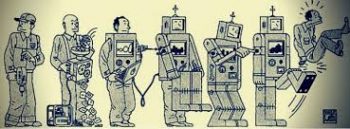
Companies in the Philippines need to adopt technologies like automation and artificial intelligence to get rid of repetitive and redundant processes, a partner of business advisory firm Grant Thornton says.
Depender Kumar, in his presentation during the 8th P&A Grant Thornton Business Forum in Manila, says Philippine companies, including business process outsourcing providers, are slow to embrace automation and struggle to change.
“To be honest, if they [BPOs] don’t change the way they do things, they will pay locally for the disruption. Most of what is done by the BPOs are repetitive. You don’t need a lot of intelligence to do the work that is with you. That is why those jobs are outsourced earlier. At the same time, if you need to survive in that industry, you need to adopt technology along the way,” he says.
Kumar says as part of digital transformation and disruptive technology, management must think digital, taking risks and responding to technological trends to stay relevant.
“A World Economic Report cites that by 2022, 85 percent of corporates are likely to expand adoption of user and entity big data analytics, the internet of things, and app- and web-enabled markets, and to make extensive use of cloud computing,” he says.
He says that in the Philippines, big conglomerates and BPOs have already started the adoption of automation in the call center and manufacturing industries, but the adoption rate is still slow.
Kumar says among the industries where AI will have the strongest impact are technology, media, telecom, consumer, professional services, healthcare, industrial, energy, public sector, finance/accounting and manufacturing operations.
“With AI in place, businesses stand to face several challenges such as disruption in business model, access to data, finding the right talent, jobless and re-skilling of existing workforce and disruption in operating model,” he says.
Despite the challenges, AI is expected to benefit businesses, Kumar says.
He says with the start of the digital age and the presence of AI, companies stand to benefit from new product development and enhancement of existing product; higher operational efficiency; improved decision making; better customer and employee experience; increase in sales; and better niche by differentiating and determining the competitive advantage.
“Adding to these is the increase in automation where companies get better employee engagement by removing mundane task. Also, AI technology makes the work place safer as dangerous tasks can be designated to machines,” Kumar says.
 (0)
(0) (0)
(0)Archive
- October 2024(44)
- September 2024(94)
- August 2024(100)
- July 2024(99)
- June 2024(126)
- May 2024(155)
- April 2024(123)
- March 2024(112)
- February 2024(109)
- January 2024(95)
- December 2023(56)
- November 2023(86)
- October 2023(97)
- September 2023(89)
- August 2023(101)
- July 2023(104)
- June 2023(113)
- May 2023(103)
- April 2023(93)
- March 2023(129)
- February 2023(77)
- January 2023(91)
- December 2022(90)
- November 2022(125)
- October 2022(117)
- September 2022(137)
- August 2022(119)
- July 2022(99)
- June 2022(128)
- May 2022(112)
- April 2022(108)
- March 2022(121)
- February 2022(93)
- January 2022(110)
- December 2021(92)
- November 2021(107)
- October 2021(101)
- September 2021(81)
- August 2021(74)
- July 2021(78)
- June 2021(92)
- May 2021(67)
- April 2021(79)
- March 2021(79)
- February 2021(58)
- January 2021(55)
- December 2020(56)
- November 2020(59)
- October 2020(78)
- September 2020(72)
- August 2020(64)
- July 2020(71)
- June 2020(74)
- May 2020(50)
- April 2020(71)
- March 2020(71)
- February 2020(58)
- January 2020(62)
- December 2019(57)
- November 2019(64)
- October 2019(25)
- September 2019(24)
- August 2019(14)
- July 2019(23)
- June 2019(54)
- May 2019(82)
- April 2019(76)
- March 2019(71)
- February 2019(67)
- January 2019(75)
- December 2018(44)
- November 2018(47)
- October 2018(74)
- September 2018(54)
- August 2018(61)
- July 2018(72)
- June 2018(62)
- May 2018(62)
- April 2018(73)
- March 2018(76)
- February 2018(8)
- January 2018(7)
- December 2017(6)
- November 2017(8)
- October 2017(3)
- September 2017(4)
- August 2017(4)
- July 2017(2)
- June 2017(5)
- May 2017(6)
- April 2017(11)
- March 2017(8)
- February 2017(16)
- January 2017(10)
- December 2016(12)
- November 2016(20)
- October 2016(7)
- September 2016(102)
- August 2016(168)
- July 2016(141)
- June 2016(149)
- May 2016(117)
- April 2016(59)
- March 2016(85)
- February 2016(153)
- December 2015(150)
